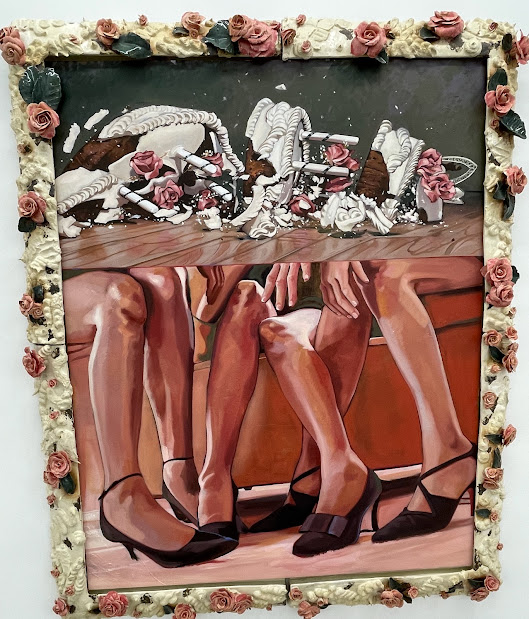(Drivebycuriosity)
- Even that I am German, I really like England. I grew up with the music by Rolling Stones, Kinks,
Beatles & Co. and I read a lot English authors from Enid Blyton to
Agatha Christie, Evelyn Waugh, Ian McEwan and myriads others. And I love
London, which I visited 5 times in several decades.Naturally
I am interested in English history, which shaped Kinks, Waugh & Co. So I began reading Peter Ackroyd´s series: "The History of England ". This post is about "The Tudors" (amazon ).
The House of Tudors ruled England for 118 years and shaped the country`s history, almost as much as William the Conqueror and his Norman relatives did 5 centuries earlier. The book focuses on four of the five Tudor monarchs, ignoring Henry VII, who lived from 1457 through 1507; and begins in the year 1507 when Henry VIII reached the throne.
Henry VIII is well known for being a monster and for his erratic adolescent behavior. The brutality, willfulness and the fate of his unfortunate six wives are well documented in so many books, plays and movies. But it is hard to feel sorry for Anna Boleyn, who was an intriguer and did what everything she could do to outmaneuver her predecessor Catherine of Aragon. And why did these women chose to become the wife of a feared monster? "The wives of kings were generally considered to be little more than brood mares".
Monster or not, Henry changed England forever. He released the country from the yoke of the Catholic Church and the rule of the Popes. The monarch did not intend to become a religious reformer, the reform was just a means to an end.
Akroyd wrote: The king "was not in the least evangelical. He only wished to augment his revenues, with the treasure of the old Church, and to increase his power". He also aimed to get rid of the command of the Pope, who - and his church - did not allow Henry´s divorce from Catherine of Aragon.
The Law of Unintended Consequences
Henry´s reformation is a example for the law of unintended consequences. But the result stays till today and defines the culture in England and the former English colonies, the USA, Canada, Australia & New Zealand. Thanks to the Tudors the country not only avoided the bloody inquisition, which tormented the populations of Italy & Spain (and the Spanish colonies). England did not participate in the messy wars which devastated the German speaking regions in the 17th century. Even today we can see the huge cultural - and economic - divide between former English colonies (US, Canada, New Zealand) and the Hispanic countries
There
already existed a parliament. But it was just summoned "as a way of informing
the nation of the king´s will"! The members of the Commons, in large
part lawyers and country gentlemen, were quite at ease with the royal
prerogative; their role was to register the king´s decrees and to shield
him from blame for unpopular measures. The Speaker was a royal official
whose salary was paid by the king and the most part of the Commons were
the king´s servants.
Henry´s son Edward tried to continue his fathers reform, but did not live long enough to make any impression. The death of his allmighty father - and his youth & frail health - seemed to invite rebellions and unrest all over the country. Henry´s daughter Mary, a radical and fundamentalist Catholic, tried to turn history back and bring England again under the Catholic yoke and hoped to import the Spanish inquisition. No wonder, she was known as "Bloody Mary". Fortunately for the English Mary`s terror regime ended with her early death.
Rise & Fall
Akroyd gave Elizabeth half of the book, more than he dedicated to Henry. Rightly so. The queen continued basically her father´s religious reform and made the separation from Catholic fundamentalism and the regime of the Popes definitive.
Obviously she was very smart, otherwise she would have not survived in this turbulent & vicious era. Too many domestic & foreign powers wanted her death, even her devout sister Mary was a danger. Elizabeth was often accused to be too indecisive. "Elizabeth vacillated. She never made a decision when one could be avoided. Procrastination was her policy in all the affairs of state."
But thanks to her caution England avoided ruinous and messy wars. Her cautious regiment started England´s conversion into a democracy and laid the foundation of England becoming a sea power. She benefited of course from many others, like Sir Walter Raleigh and Sir Francis Drake, who strengthen England´s Navy. The actions of these men and other leuds of the Queen disturbed & weakened the numerical superior Spanish navy, known as the Armada. They were important in the war against Spain and also supported the English to set foot in North America.
During Elizabeth´s regency the industry of England advanced as strongly as its commerce. The investment in looms, furnaces and forges increased; while parliamentary Acts were passed to promote the trade in leather. A lot more coal was needed for the manufacture of glass and for soap boiling. The production of pig iron rose threefold in the space of thirty years.
The Tudor epoch saw the rise & fall of men like Thomas Wolsey, Thomas Cromwell, the Duke of Norfolk and many others, who where sometimes in the favor of the king or the queen and sometimes not.
There was a lot violence and an atmosphere of fear and threat. Many lost their lives in rebellions and skirmishes. People were afraid of the afterlife. And people often behaved strange and irrational, from
the sovereign to the poorest farm hands.
They were obsessed with the Bible and
ancient Greek texts and believed in them blindly. Too many got denounced as heretics and got burned alive. Owning the wrong book could cost one`s life. The dispute whether one can eat a piece of God by swallowing a little
piece of bread (the Catholic communion) could decide about life and death. Even an improvident comment, that seemed to conflict with the common believe, could bring one on the pyre or the scaffold. I am surprised how often men and women confessed and stubbornly persisted on statements which will bring them death.
Akroyd delivered a fascinating portrait of a dangerous but also exciting era.


























